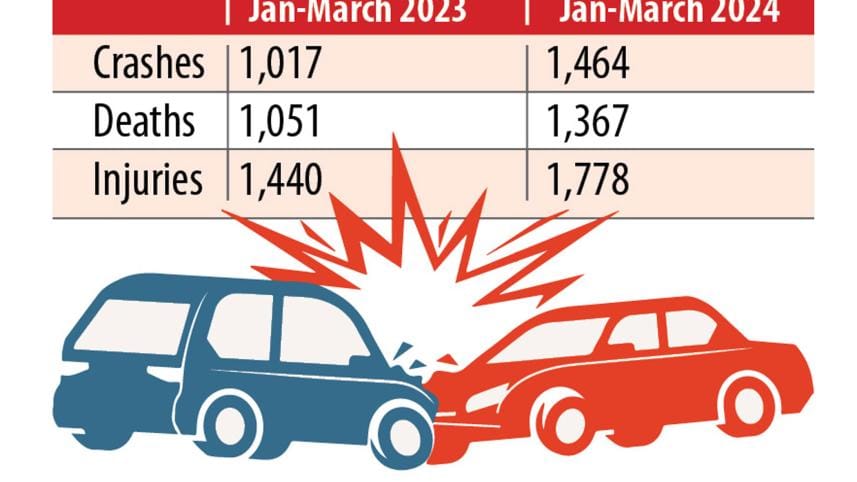Road crashes, fatalities rise steeply from January

The numbers of road accidents and deaths saw a sharp rise in the first three months of this year compared to the corresponding period last year.
Experts blamed the spike on the authorities' failure to implement specific measures and a lack of commitment to ensure road safety.
Crashes rose by 43.95 percent and deaths by 30 percent, according to Bangladesh Road Transport Authority data.
At least 1,367 people were killed and 1,778 injured in 1,464 road accidents from January to March this year, the data shows.
In the first three months of 2023, the number of accidents was 1,017, that of deaths was 1,051 and injured 1,440.
BRTA first began publishing accident data in January last year based on road crashes data collected by its divisional offices.
The transport regulator started collecting the data after top officials of the road transport and bridges ministry on several occasions sharply criticised different non-government organisations for publishing "fabricated" reports on road accidents and fatalities.
Those organisations, however, regularly published data based on media reports. They have termed the BRTA data "a very conservative estimation".
BRTA data also differs from the data collected by police in this regard, they said.
According to BRTA, at least 404 people were killed in 437 road crashes in January this year, while the numbers of deaths and crashes were 333 and 322 last January.
At least 523 people died in 569 road crashes in February this year while 303 were killed in 308 crashes in February last year.
In March this year, the numbers of deaths and crashes were 440 and 458 respectively while in March last year, 415 people died in 387 crashes.
The BRTA data said that throughout 2023 at least 5,024 people were killed in 5,425 crashes.
UNENFORCED MEASURES
A significant rise in motorcycles over the last few years is considered one of the major reasons behind the rising number of road crashes. Despite that, the government in 2021 halved the registration fees of bikes, leading to a further increase in bike numbers.
On November 15, 2022, the National Road Safety Council directed the authorities concerned to prepare a guideline for bikes. Despite a draft already prepared last year, no such guideline has been approved yet.
The number of three-wheelers, especially easy-bikes and locally-made Nosimon and Korimon, started to swell over the last decade. The authorities concerned had to ban them on 22 major highways in August 2015 as they were involved in a large number of crashes.
These vehicles, however, continue to ply the highways and their numbers have increased to such a point that even some bus routes had to be cancelled.
In June 2019, the Road Transport and Highways Division had formed a 12-member committee to make recommendations on how to control these vehicles. The committee submitted a draft guideline in 2021, which is yet to see the light of day.
In May last year, the government set the economic life limit of buses at 20 years, and trucks and lorries at 25, with an aim to reduce accidents and pollution.
However, the implementation of the limits was halted in August last year following demands from the transport associations.
EXPERTS AND AUTHORITIES SAY
Transport expert Prof Hadiuzzaman said although the country's road infrastructure saw much progress over the last decade, the quality of the public transports and drivers has not improved.
"As a result, the number of road crashes and deaths have increased."
He said the government, in some cases, has taken up contradictory policies, intensifying safety risks.
Hadiuzzman, also former director of Buet's Accident Research Institute, said small, illegal and unfit vehicles are major reasons for recurring accidents but the government has at times encouraged use of those vehicles, further increasing the numbers of crashes and casualties.
"When such vehicles could've been controlled, the government didn't take necessary initiatives. Now, it's very difficult to bring those under control. Very strong political will and commitment are required to make roads safer now."
Contacted, ABM Amin Ullah Nuri, secretary of the Road Transport and Highways Division, said, "I can't make a comment as I have not seen the data yet.
"However, we're collecting authentic data now. The previous one was not authentic."
About the measures that were not implemented, he said the enactment of guidelines for three-wheelers, scrapping of outdated vehicles and setting speed limits were all at their final stages.




 For all latest news, follow The Daily Star's Google News channel.
For all latest news, follow The Daily Star's Google News channel.
Comments